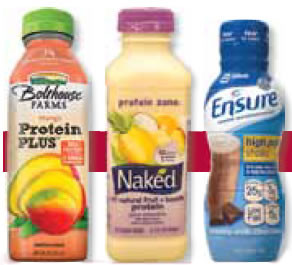
How — and why — to fit more fiber and fermented food into your meals

UTI in older women: Why postmenopausal women are susceptible to urinary tract infection, and what to do about it

Can a routine vaccine prevent dementia?

Some adults may need a measles booster shot. Who should get one and why?

Less butter, more plant oils, longer life?

Healthier planet, healthier people

Counting steps is good — is combining steps and heart rate better?

Appendix pain: Could it be appendicitis?

Can saw palmetto treat an enlarged prostate?

How does Ozempic work? Understanding GLP-1s for diabetes, weight loss, and beyond
Nutrition Archive
Articles
To prevent cancer, boost your exercise and don’t drink
Research we're watching
Move your body more and skip the alcohol to reduce your risk of cancer, says the American Cancer Society in its new cancer prevention guidelines. The updated recommendations, published online June 9, 2020, by CA: A Cancer Journal for Clinicians, also recommend cutting down on sugar and red meat, based on a review of the most recent scientific evidence.
Specifically, the new guidelines say that instead of exercising moderately for 150 minutes a week or doing 75 minutes of vigorous activity, adults should try to squeeze in 150 to 300 minutes of moderate activity or 75 to 150 minutes of vigorous activity — and that the higher number should be the target. As for diet, people interested in reducing their risk of cancer should aim to eat more plants, including whole (not refined) grains and at least two-and-a-half cups of colorful fruits and vegetables each day, and less sugar and meat (specifically limiting processed and red meat whenever possible). In the past, the ACS recommended moderate alcohol intake, but the new guideline says it's better to avoid alcohol altogether if possible. People who do drink should still stick to the previous recommended limits: no more than one drink a day for women and two drinks a day for men.
Harvard study links inflammatory diet to Crohn’s disease
News briefs
Eating a diet high in foods tied to inflammation — such as processed meat, sweets, and refined grains — is associated with many health problems, including an increased risk for colon cancer, heart disease, stroke, or diabetes. A Harvard study published online May 7, 2020, by Gastroenterology found another potential risk: Crohn's disease, a condition characterized by areas of inflammation throughout the large and small intestines. Researchers evaluated 30 years' worth of self-reported diet information from more than 208,000 men and women. Diets were scored based on foods that promote inflammation. Compared with people who had the lowest inflammatory diet scores, people with the highest scores had a 51% higher risk for developing Crohn's disease. The risk for Crohn's doubled among people who went from a low- to a high-inflammatory diet during the study. The study is observational and doesn't prove that an inflammatory diet causes Crohn's disease. But with so many other risks associated with foods that promote inflammation, it's important to eat as many foods that fight inflammation as possible. In other words, focus on whole, unprocessed foods with no added sugar — such as vegetables, fruits, whole grains, legumes (beans, lentils), fish, poultry, nuts, seeds, a little bit of low-fat dairy, and olive oil.
Image: © dla4/Getty Images
Vitamin K may offer protective health benefits in older age
In the journals
Vitamin K is an often ignored nutrient, but new research has found that low levels among older adults may increase their risk of early death. The findings were published in the June 2020 issue of The American Journal of Clinical Nutrition.
Researchers looked at about 4,000 adults ages 54 to 76 who were involved in three studies. Everyone was free of heart disease at the start of the analysis. The researchers categorized the people according to their blood levels of vitamin K, and compared that information with rates of heart disease and death over 13 years. The results showed no definite link between vitamin K levels and heart disease. However, people with the lowest vitamin K levels were 19% more likely to die during the study period than those whose K levels were adequate.
Seed of the month: Sesame seeds
Sesame seeds may be most familiar as a topping on bagels, burger buns, and breadsticks. The tiny, tear-shaped seeds have a nutty, slightly sweet flavor that's enhanced when they're baked or lightly toasted in a skillet. Most are off-white or tan, but you can also find black varieties, which are popular in Asian cuisine.
Sesame seeds contain lignans and phytosterols, plant compounds that may have cholesterol-lowering effects. They're also a decent source of calcium and magnesium, two minerals linked to better blood pressure control.
5 tips to help you stay healthy this winter
Even in an unusual year, tried-and-true strategies are still the best way to prevent illness.
Staying healthy is likely at the top of your list almost every winter. But this year, in the midst of a pandemic, it may be even more of a concern than usual. You might wonder: should you be taking special supplements to boost your immune system, or investing in cleaning devices to zap germs?
While the viral threats may be different from usual this year, the truth is that you should still be using many of the same strategies that you use in a typical year, says Michael Starnbach, a professor of microbiology at Harvard Medical School. Below are five of his top tips that can help you keep yourself and your loved ones safe.
Supplemental nutrition drinks: help or hype?
Photos Courtesy of Manufacturers |
These heavily marketed liquid meals and nutrition shakes aren't always the best option for your health. Here's what you need to look for.
Supplemental nutrition shakes and drinks can be helpful for people who struggle with a loss of appetite, have difficulty chewing, have trouble preparing balanced meals, or are recovering from surgery or an illness. But these nutrition shakes aren't magic bullets for nutrition. "The danger is that people see a lot of minerals and vitamins and think more is better," says geriatrician Dr. Suzanne Salamon, an assistant professor at Harvard Medical School. "If you use the drinks as meal substitutes that might be okay. It's not okay to eat a full meal and then drink a supplement, unless the goal is to gain weight or stop weight loss. It's too many calories."
The nutrition drinks
Supplemental nutrition drinks provide a healthy balance of protein, carbohydrate, and fat. There are hundreds of varieties that fall into two general categories.
Diverticular disease of the colon
Diverticular disease develops due to a lack of dietary fiber, and is most common in the elderly, but many people never realize they have it because there are few symptoms.
Food insecurity, COVID-19, and eating disorders
The COVID-19 pandemic shone a light on disparities in health care and socioeconomic status, and drove food insecurity to an all-time high, particularly in communities most affected by the virus. Research shows links between food insecurity and eating disorders like bulimia and anorexia.
Just a half-tablespoon of olive oil a day may help the heart
Research we're watching
Most of the evidence supporting olive oil as a heart-healthy fat comes from people living in Mediterranean countries, where olives are abundant. On average, Americans don't consume much olive oil. But those who swap in even a little olive oil to replace less healthful fats appear to lower their risk of heart disease, a new study finds.
Researchers relied on health and diet data from nearly 93,000 adults in two studies beginning in 1990. Over the next 24 years, there were nearly 10,000 cases of heart disease in the group. After adjusting for other dietary habits, age, and other heart-related risks, the researchers found that people who consumed at least a half-tablespoon of olive oil a day had a 14% lower risk for heart disease compared with people who used no olive oil.

How — and why — to fit more fiber and fermented food into your meals

UTI in older women: Why postmenopausal women are susceptible to urinary tract infection, and what to do about it

Can a routine vaccine prevent dementia?

Some adults may need a measles booster shot. Who should get one and why?

Less butter, more plant oils, longer life?

Healthier planet, healthier people

Counting steps is good — is combining steps and heart rate better?

Appendix pain: Could it be appendicitis?

Can saw palmetto treat an enlarged prostate?

How does Ozempic work? Understanding GLP-1s for diabetes, weight loss, and beyond
Free Healthbeat Signup
Get the latest in health news delivered to your inbox!
Sign Up











